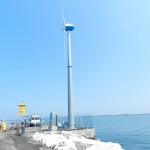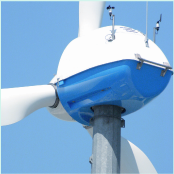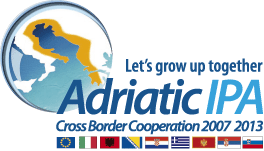- E.R.A. (Energie Rinnovabili Albania) sh.p.k.
Rruga Sami Frasheri nd. 14 H.11, ap.8 PO BOX 232/1 Tirana
mob ita : +393292740163
mob alb: +355673158135Albanian law partnership that was founded in 2011 with the aim to develop and build plants to produce electricity from renewable sources in the Balkan territory and Albanian in particular.
As a sponsor of Project Powered provides data collected by the wind tower located in the town of Milot
- The reports on Project Powered at the ‘Smart energy expo’ Verona October the 11th 2013
The reports on Project Powered at the meeting ‘A Socio-Environmental approach to off-shore wind parks planning. IPA Adriatic POWERED Project contribution to best practices, impacts mitigation and environmental analysis’, which has been hosted October 11th in Verona at the ‘Smart energy expo’.
Ercole Cauti, Project manager Powered Project
Ercole Cauti, Project manager Powered Project en
Renato Ricci Sergio Montelpare – presentazione Verona-2013 UNIVPM prima parte
Renato Ricci Sergio Montelpare – presentazione Verona-2013 UNIVPM seconda parte
Antonio Pusceddu, Marche Polytechnic University
Otello Giovanardi, Veneto Agricoltura Consultant prima parte
Otello Giovanardi, Veneto Agricoltura Consultant seconda parte
Otello Giovanardi, Veneto Agricoltura Consultant terza parte
Otello Giovanardi, Veneto Agricoltura Consultant quarta parte
Adrian Judd, Centre for Environment, Fisheries and Aquaculture Science
- Powered at Verona ‘Smart energy expo’
Is it profitable to build wind farms offshore in the Adriatic sea for producing green energy? What are the socio- economic and environmental impacts from installation of hundreds of dozens of meters high turbines on the open sea? How much “green” energy could be produced with this system and at what cost? The european cross-border Project Powered tries to answer to these questions: it aims to analyze, from a scientific point of view, the advantage (or not) to exploit in the future the strength of the wind blowing along the Adriatic Sea, from Trieste to Puglia, from Croatian islands to Albania.
Veneto Agriculture has promoted today at the Smart Energy Expo of Verona a conference on this important topic: the event is useful to take stock of the progress of the project. It’s important to stress that the initiative doesn’t aim to build a wind farm in the Adriatic, but to understand – through the development of a scientific study – if in the future it will be profitable to carry it out. There are many expectations on the results that Powered will provide, because part of the countries bordering on the Adriatic have a huge need for clean energy, and also because there are concerns on the potential environmental impacts of a new “thing” like an offshore wind farm. There are several subjects involved in the project: Abruzzo Region (leading partner) , the Marche, Puglia and Molise Regions, the Province of Ravenna , the Ministry of Environment of Italy, the Politecnica University of Marche, the Cetma group, the Micoperi Marine Contractors Ltd, and Veneto Agriculture. For Croatia, the City of Komiza, for Montenegro the Ministry of Economy (Department of Energy), for Albania the Ministry of Economy Trade and Energy.
In recent years the wind energy realized in land in Italy has increased considerably (it is the 5 % of the total energy produced), whilst the offshore one didn’t increase much. The exploitation of offshore wind energy, on the contrary, has increased especially in the northern Europe seas, where they build 1,5 turbines per day. England and Denmark are the countries that most invest in the construction of these offshore wind farms; but also Germany, Spain and France are following the same path.
Project Powered therefore represents a strategic starting point for evaluating if the winds of Adriatic sea can be exploited to produce green energy. The project, in its complexity, also includes the installation of a series of anemometer towers to test the wind potential in each of the areas: a large amount of data will be collected and conveyed to a public network. The supply, installation, maintenance and disposal at end of cycle of the network will be managed by the Polytechnic University of Marche, scientific coordinator of the project. The final results of the study will be essential to evaluate cost-benefit and interactions between wind farms, marine environment and human activities. Veneto Agriculture has verified the ability to install one of the towers in its farm ValleVecchia in Caorle (VE) (the authorization request is pending). Veneto Agriculture will be involved in particular in the deepening of the impact of structures on marine and coastal economic activities linked to the Adriatic Sea , with special reference to fishing, and mitigation works / environmental opportunities associated with these great works.
- Powered Project at the ‘Smart energy expo’ in Verona, October 11th
‘A Socio-Environmental approach to off-shore wind parks planning. IPA Adriatic POWERED Project contribution to best practices, impacts mitigation and environmental analysis’ is the title of the conference that will be hosted october 11th at the event ‘Smart energy expo’ (Puccini Hall, Congress Center Arena, pad 6/7, Verona october 9th – october 11th, web site).
Here’s the program of the conference:
10.00 Registration and welcome coffee
10.30 Authorities welcome speeches
10.40 ‘Powered project presentation’: Ercole Cauti, Project manager Powered Project
10.50 The ‘Powered’ Project: a new step to knowledge toward off-shore wind power scenarios in Adriatic Sea Basin’ Renato Ricci, Department of Industrial Engineering and Mathematical Sciences – Marche Polytechnic University
11.10 ‘Environmental aspects in establishing Wind Energy networks in off-shore conditions. A multi-functional approach’. Antonio Pusceddu, Marche Polytechnic University
11.30 ‘Planning mitigation in Off-Shore Wind Farm establishment. Impacts on biological resources and fisheries in the Adriatic Sea environmental context’ Otello Giovanardi, Veneto Agricoltura Consultant
11.50 ‘A positive experience from Great Britain and Northern Europe: Best Practices in off-shore wind parks environmental impact analysis’. Adrian Judd, Centre for Environment, Fisheries and Aquaculture Science (CEFAS)’
12.50 ‘Wind Power in Italy and environmental debate, from NIMBY to BANANA syndrome?’ Edoardo Zanchini, Legambiente Italia
13.20 Conclusions Antonio Sorgi, Director for Energy Department – Abruzzo Region Project Powered Lead Partner
- September 28th a bike ride to visit the small wind turbines of Porto Corsini
Saturday September 28th 2013 is the day for the campaign ‘Clean up the World 2013’. Many initiatives have been scheduled: in Ravenna will take place ‘Wind turbines’, a bike ride from the center to Porto Corsini organized by the Province of Ravenna, the FIAB and Legambiente. In Porto Corsini the technicians of the Tozzi Company will conduct a guided tour of the two new small wind installed thanks to Project Powered.
The bike ride – about 30 kilometers long (round trip) – will start at 9 am in front of the Province of Ravenna – which is one of Project Powered partners – then will continue to the train station, where there will be another gathering point (9.10 am). From the station the ride will proceed along the bike path to Punta Marina, passing through the Pinewood so to arrive to Marina di Ravenna, where the harbor channel will be crossed by ferry to arrive at Porto Corsini (the cost of the ferry ticket is 1 euro). In Porto Corsini is scheduled the tour of the two small wind turbines that contribute to ‘keep the world clean’. The ride will return to Ravenna around 1 pm. Info and registration: amicidellabici.mlr @ gmail.com. During the ride, as is usual for Legambiente campaign, the participants will be asked to remove the waste they will find along the way (plastic bottles, cans, paper …).
- November 6th-9th, Powered at the Wind Key in Rimini
The Project Powered will be present with an exhibition stand at Key Wind, the section dedicated to wind energy of Key Energy, the event hosted in Rimini from November 6th to November 9th. November 6th is scheduled a meeting on topics related to the Project Powered and, in general, the wind energy.
- Meeting in Ravenna, 2013 June 28th, press release
Il resto del carlino 29 giu 2013
corriere di Romagna 29 giu 2013
Europuglia.it Progetto Powered: inaugurato impianto minieolico a Porto Corsini 2 lug 13
Ilnautilus.it Porto di Ravenna: operativo mini-impianto eolico su molo di Porto Corsini 18 lug 13
Ansa Porti attivo impianto minieolico su molo Ravenna 15 lug 13
Più Notizie Progetto Powered: l’intervento del vicepresidente della Provincia Gianni Bessi 28 giu 13
Ravenna24ore È entrato in funzione il mini impianto eolico a Porto Corsini 15 lug 13
Energia24club.it Con il progetto Powered si testa il minieolico nel porto di Ravenna 24 lug 13
Settesere Niente grandi parchi eolico off-shore, ma micro e mini impianti funzionano 3 lug 13
Lapiazzavvenimenti.it Impianto minieolico al Terminal Crociere di Porto Corsini
Ravennaedintorni Progetto Powered: un minieolico sulla diga foranea di Porto Corsini 3 lug 13
- Online the video report on the small wind turbine of Porto Corsini
The video report on the new small wind turbine inaugurated in Porto Corsini June 28th.
youtube: http://youtu.be/R3LkUjwjXCU
Ravennawebtv web site: http://www.ravennawebtv.it/w/il-mini-eolico-di-porto-corsini-pronto-per-la-produzione-di-20-mila-kwh/
- The small wind turbine of Porto Corsini works at full capacity
After a short period in which has been made the connection with ENEL, the small wind turbine installed on the north
 breakwater of Porto Corsini, started up June 28th, reached the full functionality. The small wind turbine realized by Tozzi Nord was installed by the Province of Ravenna, in cooperation with the Port Authority of Ravenna and thanks to Project Powered (Project of Offshore Wind Energy: Research, Experimentation and Development). The small wind turbine model TN535 provides 10 kw of power: it is expected to produce about 20,000 kwh per year, helping to offset (at least partially) with renewable and clean energy, the energy consumption of the Cruise Terminal. The installation of the system is a confirmation of the importance of the Project Powered: in addition to providing data on the strength of the wind and weather, to understand whether and where to build large offshore wind farms in the Adriatic area, the project makes possible the conditions for exploiting the wind strength even in areas, along the Adriatic coast and nearshore, particularly in ports, where the wind power is not intense, but where development costs are considerably lower than for the largest offshore wind farms. In this direction, the installation of the small wind turbine, which is purely experimental, is a first step in the direction of an important goal like the green port.
breakwater of Porto Corsini, started up June 28th, reached the full functionality. The small wind turbine realized by Tozzi Nord was installed by the Province of Ravenna, in cooperation with the Port Authority of Ravenna and thanks to Project Powered (Project of Offshore Wind Energy: Research, Experimentation and Development). The small wind turbine model TN535 provides 10 kw of power: it is expected to produce about 20,000 kwh per year, helping to offset (at least partially) with renewable and clean energy, the energy consumption of the Cruise Terminal. The installation of the system is a confirmation of the importance of the Project Powered: in addition to providing data on the strength of the wind and weather, to understand whether and where to build large offshore wind farms in the Adriatic area, the project makes possible the conditions for exploiting the wind strength even in areas, along the Adriatic coast and nearshore, particularly in ports, where the wind power is not intense, but where development costs are considerably lower than for the largest offshore wind farms. In this direction, the installation of the small wind turbine, which is purely experimental, is a first step in the direction of an important goal like the green port.
- The reports of the meeting in Ravenna ‘The potential of wind energy in the Adriatic Sea and the prospects of the green port’
The reports of the meeting ‘The potential of wind energy in the Adriatic Sea and the prospects of the green port’
hosted in the Congress hall of the Port Authority of Ravenna June 28th 2013Carlo Cacciamani Arpa Emilia-Romagna





 English
English Italiano
Italiano